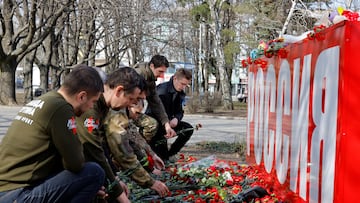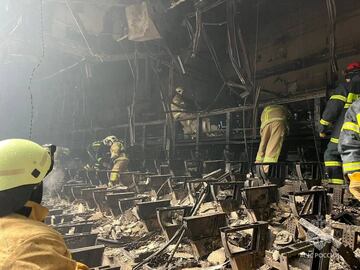WORLD NEWS
Moscow attack: How is ISIS-K different from ISIS?
ISIS-K has taken responsibility for the tragic attack in Moscow that claimed the lives of 115 people. How does the organization differ from ISIS?

Moscow suffered one of the deadliest terrorist attacks in its history on Friday evening. As of Saturday morning, the death toll stood at 115, with dozens more in critical condition. Authorities believe that several gunmen entered Crocus City Hall concert hall, which can hold up to 9,000 people, and opened fire. Additionally, an accelerant was released, setting the venue on fire and making it more chaotic as concert attendees attempted to escape.

The relationship between ISIS and ISIS-K
ISIS-K, as the United States federal government refers to the organization, has claimed responsibility for the attack. The group’s origins lie in Afghanistan’s Khorasan Province and is seen by many security analysts as the South and Central Asian offshoot of the Islamic State of Iraq and the Levant (ISIL), which was established in 2006. The regional outpost surfaced in 2015 and, in tandem with ISIS, has grown in strength in recent years, with this most recent attack highlighting the dangers posed by the groups and the widespread destruction they can create with few resources. The United Nations was following the development of the group closely and reported in 2016 that ISIL was working “to develop a network of contacts and sympathizers who carry out attacks in its name” in both Afghanistan and Pakistan. One of the earliest attacks carried out by ISIS-K was that which targeted the Pakistani Consulate in Jalalabad, Afghanistan.
The Moscow attack follows another carried out by ISIS-K, according to US intelligence sources, in Tehran on 3 January. The group detonated two bombs that killed 94 people and injured hundreds more at a ceremony marking the fourth anniversary of the assassination of Iranian general Qasem Soleimani, which took place under the Trump administration.
Why would ISIS attack Russia?
Over the last two years, ISIS-K’s propaganda began to target the Russian government, and in particular, President Vladimir Putin. The motivation for the attack was not stated when the group claimed responsibility. However, the Russian government has speculated that the gunmen and ISIS-K members were paid to carry out the gruesome killing. Russia’s Investigative Committee announced that the assailants had been captured fleeing towards Ukraine. The Ukrainian government has denied any responsibility.






